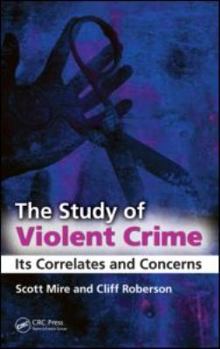The Study of Violent Crime: Its Correlates and Concerns
Violence is a complex subject that is rooted in a multitude of disciplines, including not only criminology but also psychology, sociology, biology, and other social science disciplines. It is only through understanding violence as a concept that we can hope to respond to it appropriately and to prevent it. The Study of Violent Crime: Its Correlates and Concerns is a comprehensive text that provides a current analysis of violence and violent crime in the United States.
Topics discussed include:
The history of violence in Europe and America Whether violent behavior can be predicted Possible correlates of violence, including values, poverty, low education, abuse and neglect, alcohol abuse, and shame Sociological theories surrounding crime causation, including social control, conflict and strain, and anomie Psychological approaches to understanding violence from Freud, Bentham, Skinner, and others Biological theories and the influence of positivism and determinism The role of early exposure to violence on future behavior and programs to counteract these effects Gang activity and hate crimes The history of punishment and its effectiveness Victimology and victimization
Organized in logical fashion, each chapter builds on previous ones and makes use of concrete examples to clarify concepts. Action boxes help readers focus on salient points and review questions appear at the end of each chapter, enabling readers to test their assimilation of the material.





